Georgia STOMP 2021 Legislative Priorities

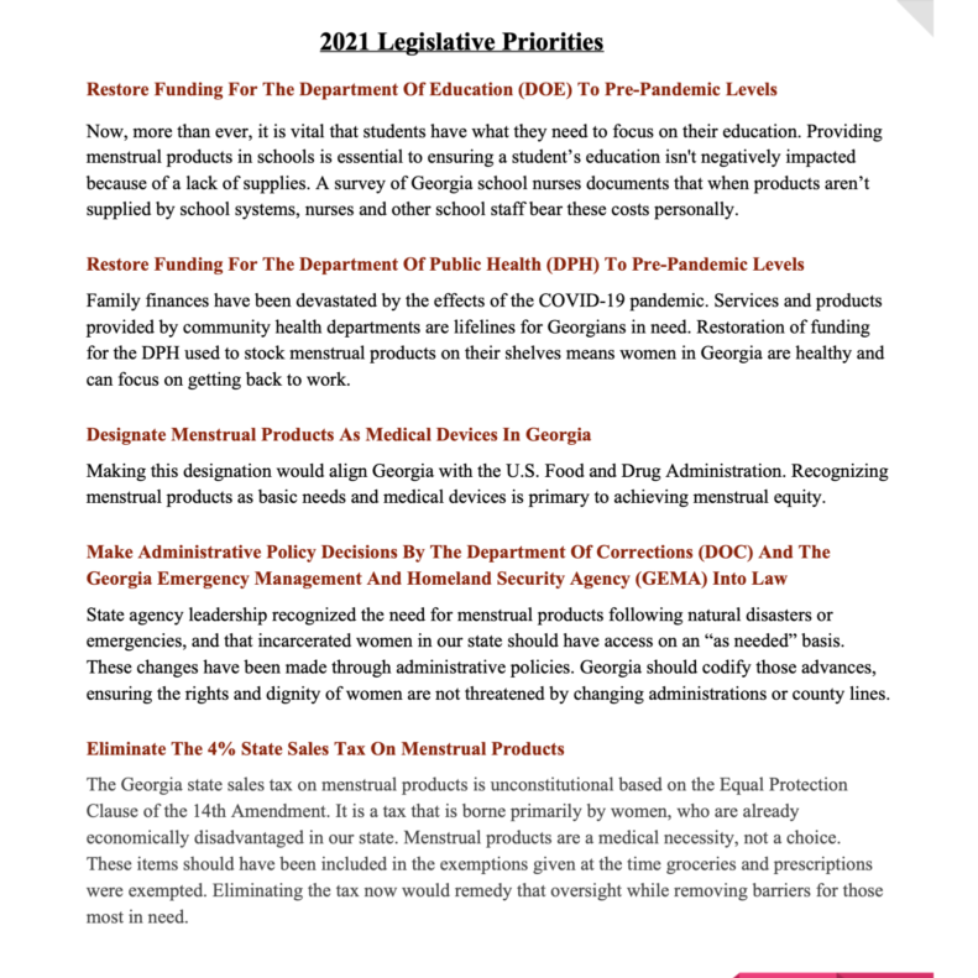

It isn’t news to any of us that the pandemic has resulted in lost or reduced wages for many Georgians. The Georgia STOMP coalition is aware of food and housing insecurities many are experiencing, and that concern extends to the increase in period poverty amongst menstruators.
Necessary public health safety measures, like limitations on size and ability to gather, have forced sudden operational changes onto non-profits and agencies working in our communities. In light of this, we reached out to Georgia STOMP Coalition partners seeking updates on how collection and distribution of period products is occurring in the time of COVID-19.
Be inspired by their work and their ability to “pivot” in their mission and modes of operating!
“The biggest challenge of Covid-19 for Posh Pack Inc. has been adapting in a pandemic to continue to serve our communities, but through a different lens. With the shutdown of schools, it no longer served our target population to provide donations to schools without students present. We really had to rethink how to fulfill our mission and do it in a way that was safe in a pandemic. After speaking with a number of organizations, it was apparent that menstrual items were needed more than ever. We discovered many parents were already going to food pantries to receive food donations. It made sense to connect the two and have parents be able to receive food and feminine hygiene items at the same time.
As a result, Posh Pack, Inc. has developed a programming focus to make sure young women and girls have access to feminine hygiene during the pandemic. Posh Pack, Inc. spent February through July, giving feminine hygiene essentials to different organizations that are directly connected to women and girls who need these items most. Since February, as a result of donations, we have been able to give 5000 pads to organizations to include food pantries, homeless shelters, and civic organizations focused solely on period poverty. With continued support from donors, we hope to donate over 10,000 pads by the end of the year.” — Dr. Elesia Glover
“PERIOD Atlanta is working harder than ever to meet the needs of menstruators in Greater Atlanta. This past summer, we donated more than 6,000 menstrual products to various organizations, including the Clarkston Community Health Center and Women’s Refugee Network. Despite the geographic distribution of our officers and members throughout the metropolitan area, PERIOD Atlanta hopes to use the new virtual opportunities that the pandemic has opened up for us and start working in the advocacy arm of our work in the fall.” – Sophie Lee
The Homeless Period Project of Atlanta has completely shifted our way of doing things.
Instead of the excitement of period packing parties, we’re now asking for products either by purchasing off our Amazon Wish List or just buying and mailing to us.
The four board members divide and conquer by packing at home and delivering to our community partners. The need is still there and we are working HARD to fulfill.
Please visit our Instagram page (@homelessperiodprojectofatlanta) for updates and information. Our wishlist link is in our bio. One box of pads helps. It’s that simple. Please email us if you want to get involved. atlanta@homelessperiodproject.org — Torrey, Brittany, Rilla and Jennifer
“Currently, La Lune has donated 559 care packages (5,964 menstrual products) and we are working on delivering at least 200 more before the end of the month. As the global pandemic has disproportionately affected marginalized communities, we have been donating to those in great need in Atlanta, Georgia; Bronx, NY; and Houston, Texas. In Atlanta, we have donated to City of Refuge Atlanta and Covenant House Georgia. We are continuing donations to refugee centers, detention centers, and any community centers that request such donations.
We have also partnered with re-entry intervention programs such as the Gwinnett Re-entry Intervention Program (working in Gwinnett County Jail). After touring the facilities and talking with Sergeant Baird from the GRIP program, we are beginning to establish a PenPal and Zoom interactive program with individuals (primarily women and all menstruators). The GRIP program works to aid in core issues such as drug addiction, mental health, and poverty and provides housing and case management upon release, access to mental health services, a primary care doctor, and job assistance. In addition to the discomfort around menstruation, there is a prevalent disconnect between those in the prison system and the rest of the community due to prejudice and stigma. To bridge this gap, we are interviewing and releasing the stories of consenting individuals with our photojournalist: Jade Hidalgo. We want to show the public that these are good people and connect them with the community with monthly Zoom calls to truly get to know these individuals and establish solid relationships.
We are working with DivaCares and researchers from UGA and Emory to establish our first official educational program in Clarkston, Georgia. The classes will be held online and will work with 4th and 5th graders on the topic of menstruation. This education program will teach boys, girls, and all genders in an all-inclusive, discussion-based environment. We are working towards a future in which the stigma around menstruation is eliminated and all menstruators are well-equipped and educated on proper menstrual hygiene. However, it is important that all students learn about menstruation, before they, and their friends get their periods. We will also be providing menstrual products and hygiene essentials to our students and their families. — Stella Kwon
If we haven’t heard from you, send us your stories and how your organization has morphed and adapted during 2020!

Since the work of Georgia STOMP began in 2017, leaders have tried to base advocacy decisions on hard data and known facts concerning the need for period products in various cohorts of Georgia’s population.
The recurring issue has been a severe lack of data! Research exists in low-income countries, but the need for period products in the US, remains, for the most part, undocumented. Other than an oft repeated result of a study done in 2017 by Always Brand — “Nearly 1 in 5 American Girls Have Missed School Due to Lack of Period Protection” — little data has existed.
In February of 2019, a study out of St. Louis University looked at the “Unmet Menstrual Hygiene Needs Among Low-Income Women.” Georgia STOMP attendees at the 2019 National Summit for Period Leadership were thrilled to hear a presentation of that study by lead researcher, Dr. Anne Sebert Kuhlmann. Look for an article published by Dr. Kuhlmann, soon!
At the same event, Dr. Kelley Massengale, Director Research & Evaluation at the Diaper Bank of North Carolina, presented research compiling data from The Alliance for Period Supplies (APS) Allied Programs. These programs provide menstrual products at locations throughout the country. A full paper on that research is forthcoming, but Dr. Massengale, recently provided Georgia STOMP with a summary of the preliminary results.
As Georgia STOMP has grown as a coalition, a concerted effort has been made to connect with public health researchers throughout the state working to understand the health needs of women. Numerous of these distinguished researchers have formally joined the coalition and are pursuing research projects to shed light on unmet menstrual needs in Georgia. We are grateful for their input, insights and guidance as we seek to align public policy with the need for menstrual equity.
Additionally, Georgia STOMP is aware of 4 research projects addressing menstrual equity and the elimination of period poverty currently underway:
The existence of these studies and how they will inform future advocacy and policy work of Georgia STOMP cannot be overstated!
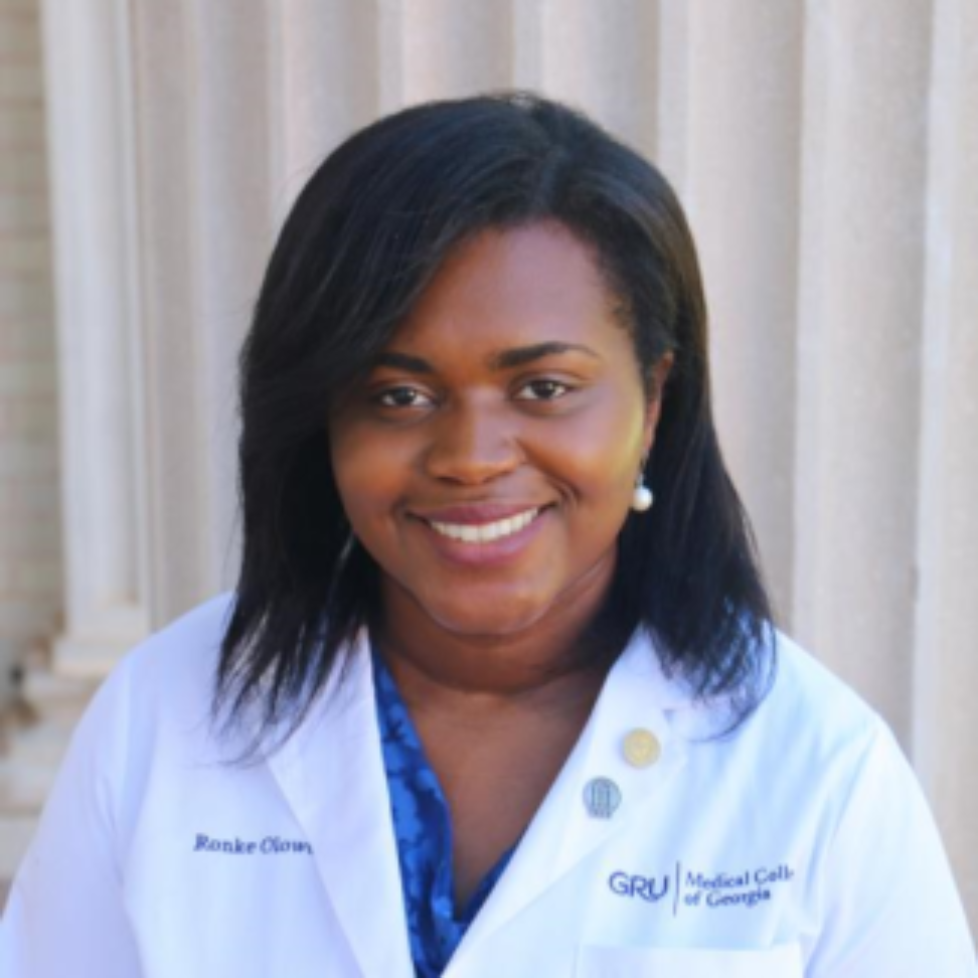

Guest Blog by Dr. Ronke Olowojesiku, recent graduate of Augusta University/University of Georgia Medical Partnership and the Medical College of Georgia. Prior to her move to Washington, DC to begin her Residency, Dr. Olowojesiku was an active supporter of Georgia STOMP through partner organization, Period UGA.
Something as simple as reaching into a drawer for a tampon or pad can easily be taken for granted. Imagine if before reaching into said drawer, you had to ask permission to do so, and that, once permission was granted, it no longer mattered because the drawer was empty and would not be refilled until later. In the meantime, you had to make do with pieces of toilet paper or nothing at all, hoping that you would not soil yourself, sitting in feelings of anxiousness and humiliation. This narrative reflects the stories that were shared by women currently imprisoned in the state of Georgia. In February 2020, a survey was conducted at Whitworth Women’s Facility, a state penitentiary in Hart County, Georgia, asking women about their experiences with menstrual product access at their local and county prisons prior to transfer to Whitworth, and their experiences at the state prison. The findings from the survey speak to an under addressed issue within our state with regards menstrual product access for those who are incarcerated.
The 11 women who responded to the survey were held at 10 different local and county facilities prior to transfer to Whitworth. While most of the respondents said that menstrual care products were available free of charge at their local or county facility, almost all of them said they did not have direct access to the products. They typically had to go through a prison official to gain access, and many times these officials were male. In describing their experiences in accessing products, the women shared feelings of embarrassment, apprehension, and/or feeling dismissed or not being taken seriously. Says one respondent regarding requests for products,
We often were made to feel like a burden for asking for more. It was very humiliating having to ask the men and nothing we could do if they chose not to or forgot.
Yet another woman reported having to wait to get products, saying,
If your menstrual started while we were in our cells we were told to use tissue until ‘free time.’
In contrast to these reports, at Whitworth, products are kept in a central cabinet which the women have unrestricted access to. While some reported concerns of others taking more products than needed, overall, less women reported issues getting products or feeling uncomfortable about accessing products when compared to their prior experiences at local and county facilities. This finding is promising and presents an alternative for managing menstrual health and hygiene in prisons.
Adequate menstrual hygiene helps to prevent reproductive and urinary tract infections, as well maintain individual dignity. Menstruation is a normal, physiological process that should be respected and well cared for, regardless if one is imprisoned or not. The reports from these women show that providing the products is not good enough; thought and care into how these products are distributed is needed. If there are obstacles, such as having to pay for products, having to go through a prison official, or having to ask a male official, then those who need the products are less likely to get them and are more likely to experience poor outcomes as a result. No one should be made to feel like a burden for a process that their body naturally undergoes, and steps should be taken to ensure that this is not so.
Dr. Olowojesiku’s Data Summary in pdf format: Menstrual Product Survey from Whitworth Women


Last night, this message was sent to all School Nurses in Georgia, from Krista Lowe, the School Nurse Consultant for the Department of Education.
If you are a school nurse, hope you have already seen it and taken action!
If you are an advocate but not a school nurse, connect with your local school system to encourage them to do everything they can, to get state funded period supplies to their local nutrition director for distribution!
“Periods don’t stop for pandemics,” as pointed out in this New York Times piece over the weekend. Students need these products during distance learning as much as they needed them when in the school building!
Thank you for reminding us of that, Krista!
Good evening,
I hope you all are staying home and healthy. I have heard so many wonderful stories of all of the things our school nurses are doing across the state while their students are at home. I know many nurses are working to help distribute school meals to students in need. I wanted to suggest that if your district has spent their feminine hygiene grant money to purchase the products, districts should think of various ways to get these products to their girls in need. Dr. Linette Dodson, State Director for the School Nutrition Program, has reached out to the local nutrition directors to encourage distribution of these items when distributing lunches to students. Please consider ways to help our girls who could benefit from this program, and feel free to share any innovative ways your district is distributing these products.
Sincerely,
KristaKrista Lowe, M.Ed., BSN, RN
School Nurse Consultant
Georgia Department of Education
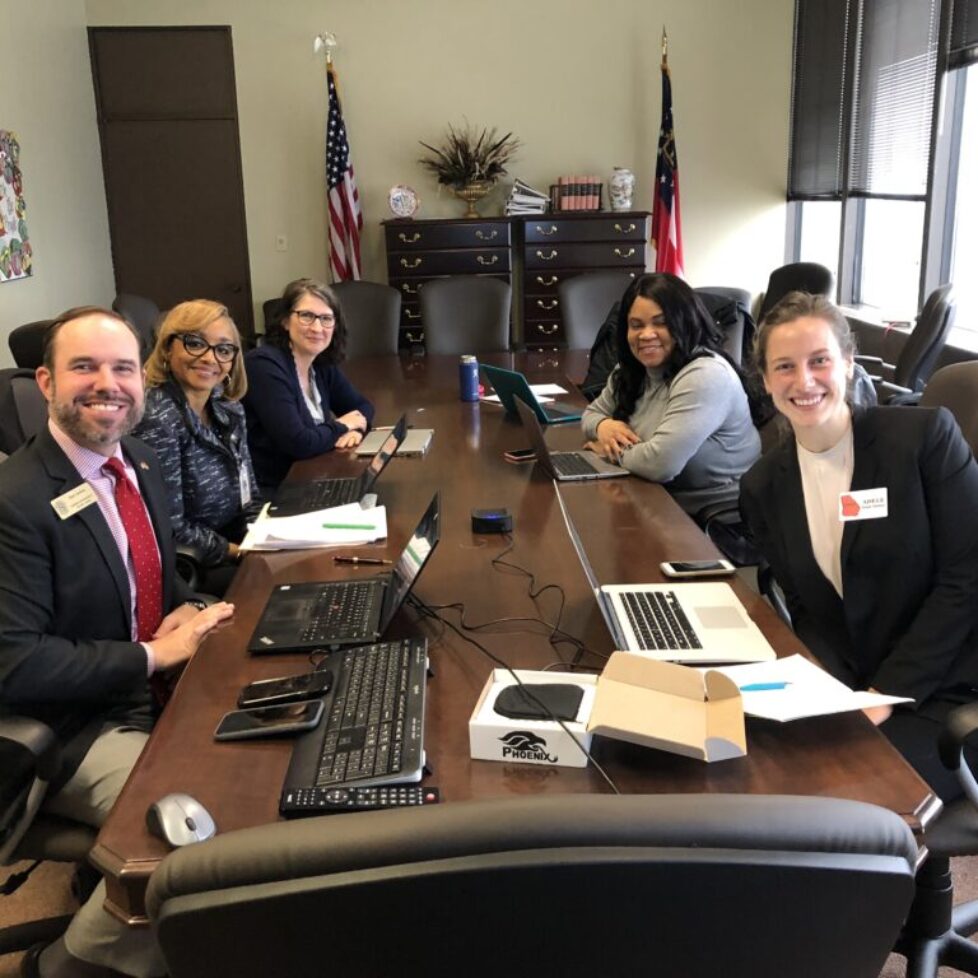

On Monday, February 24th, Georgia STOMP, in cooperation with partner, Georgia Association of School Nurses (GASN), held a webinar for school nurses to learn more about the funding available for the purchase of period products in Georgia’s schools. The webinar was hosted by the Department of Education (DOE), with Matt Cardoza, Assistant Director of Policy and External Affairs, providing crucial assistance both operationally and as a participant, answering questions from attendees.
Lynne Meadows, GASN State Director, has worked closely with Georgia STOMP to assist school nurses efficiently distribute funds allocated by the state for the purpose of providing feminine hygiene products in schools. This webinar was a natural next step in the GASN/Georgia STOMP partnership.
Over 160 nurses/counselors/social workers joined online to learn how the money was distributed and hear three case studies regarding best practices underway in Georgia. Distribution programs in Muscogee County (Florene Dawkins), Troup County (Tabitha Coverson) and Marietta City Schools (Dr. Rona Roberts) were highlighted. Additionally, Dr. Andrea Swartzendruber from UGa’s College of Public Health, discussed the need for these products and the negative effects on learning, self-image and development, that a lack of period products can cause.
A Q&A session at the conclusion of the presentations was fully utilized by nurses, with questions submitted from all over the state. With GASN, DOE, Georgia STOMP, experienced nurses and those leading the state with successful wrap-around services, all in the room, it was an informative session of learning what the money can, and cannot, be used for and how to spend it.
If you missed the webinar, it is well worth a listen. You will find it here.
Thank you to all our presenters and to GASN and DOE for such a fruitful partnership!



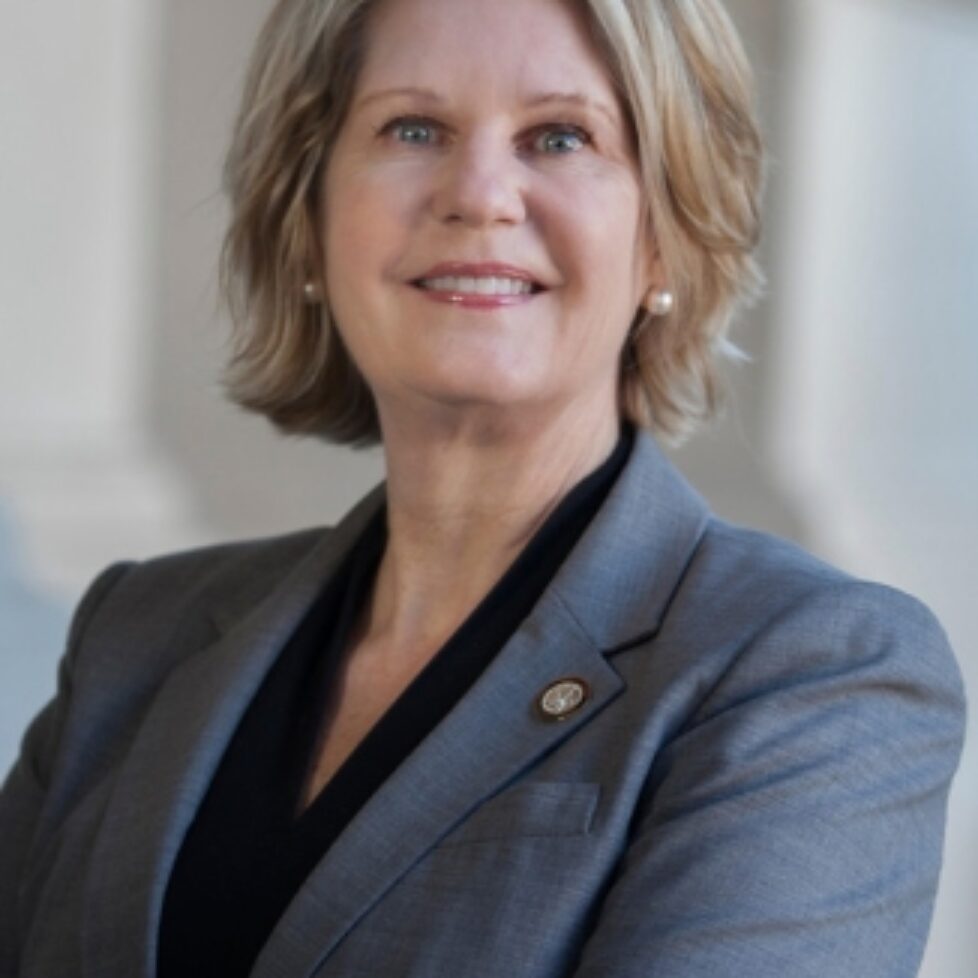
On Wednesday, January 22nd, Dominique Holloman (Chair, JL of Ga SPAC), and Adele Stewart (Co-Lead, Georgia STOMP), met with Speaker Pro Tempore Jan Jones to discuss her support of menstrual hygiene product availability in schools and inquire how Georgia STOMP could assure the continued allocation of funds for that purpose.
The Speaker Pro Tem was strong in her support of this initiative, and plans to add language this year focusing the allocation on districts and schools that have both high poverty rates and surrounding areas of low wealth. That, she says, will ensure schools which cannot fund these products on their own, will receive the money and get the products to students most in need.
Moreover, the Speaker Pro Tem noted that Georgia STOMP would do well to identify additional gaps in menstrual product access where the Legislature’s attention may be impactful. If you have seen gaps in your community, please email us with your experiences so that we might gather feedback and offer anecdotal evidence about addressable instances of period poverty in Georgia.
Stay tuned for more updates on HB8 as the legislature returns this week!

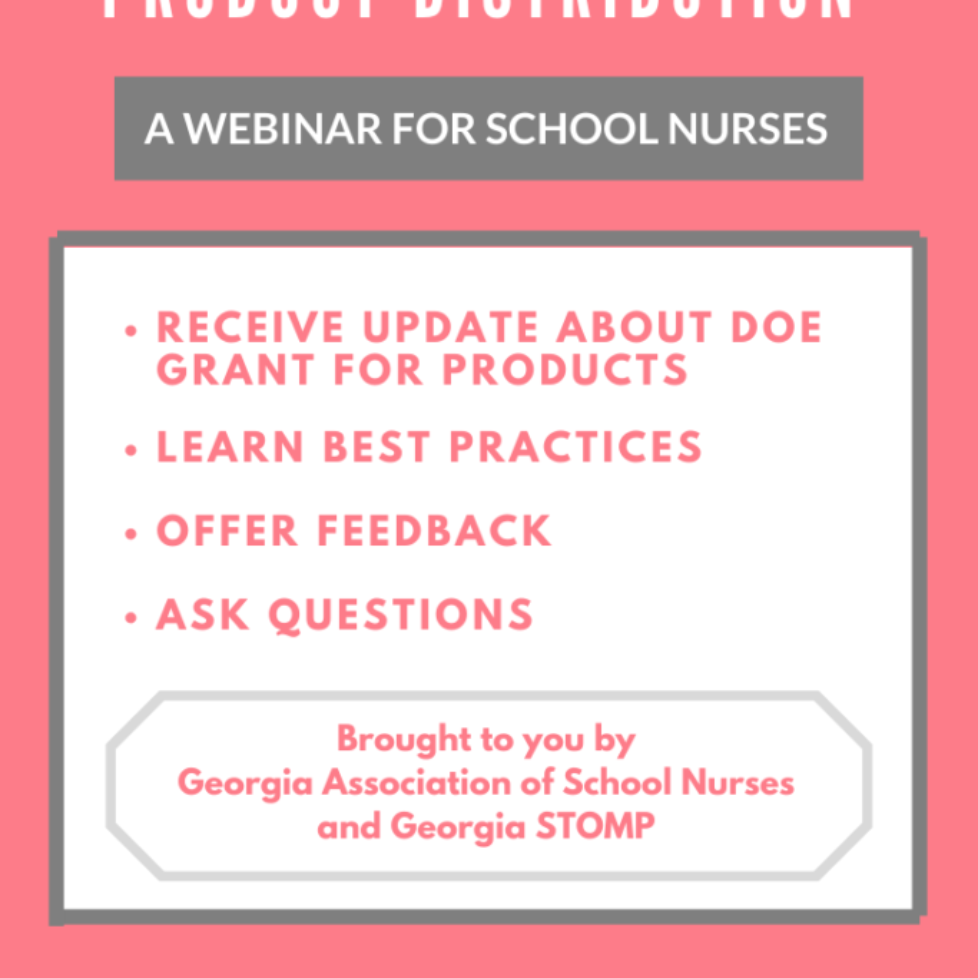
On February 24th at noon, Georgia STOMP is honored to work alongside the Georgia Association of School Nurses to host a live webinar for school nurses and other school employees who distribute period products to students in Georgia. The webinar will originate on a platform provided by the Georgia Department of Education and include an opportunity for real time Q&A by participants.
The webinar will begin with an update on the distribution of funds earmarked in the 2019 legislative session for the purchase of feminine hygiene products in Georgia’s public schools, and through local health departments. Several case studies featuring local school leaders will highlight how various districts are distributing the funds and addressing the needs of students while minimizing stigmatization. Dr Andrea Swartzendruber, a Georgia STOMP coalition research partner from UGa, will speak on the developmental and psychological importance of accurate information related to menstruation, in addition to access to products. The webinar will conclude with Q&A from participating school staff and presenters.
As a Georgia STOMP follower, make sure your local school staff is aware of this opportunity!

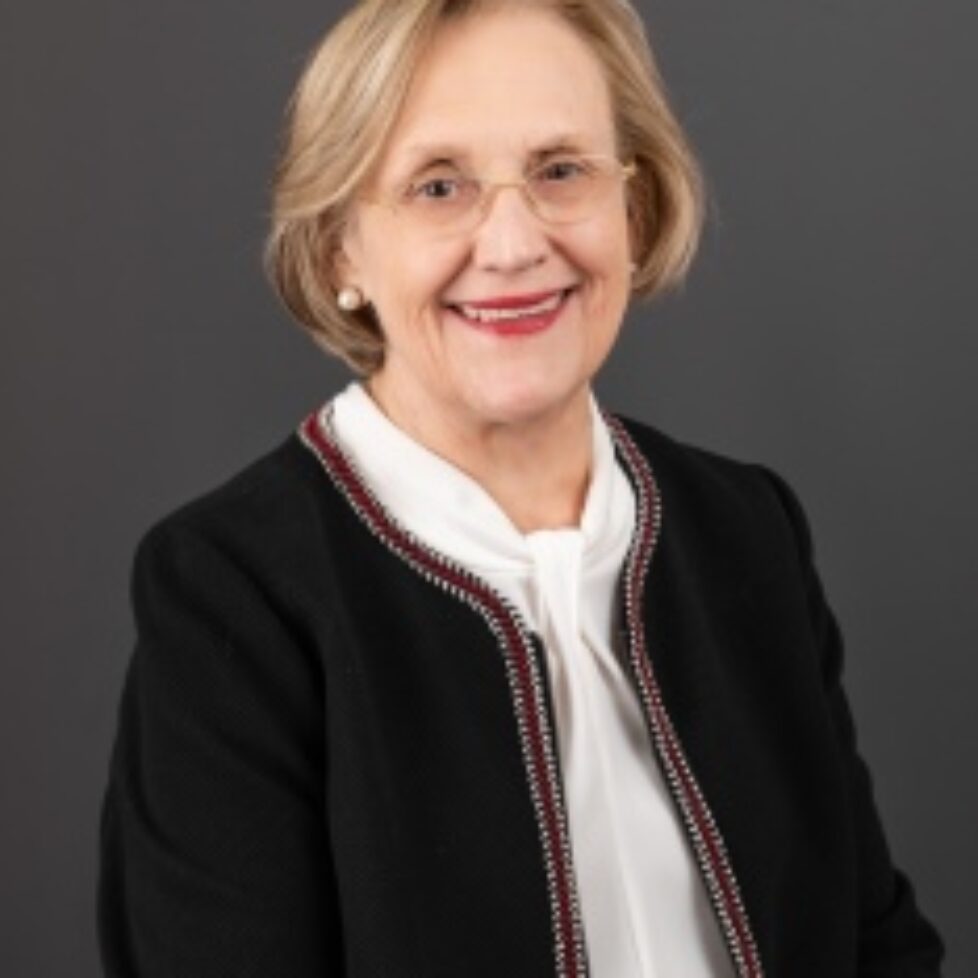

Following a request from Rep. Debbie Buckner and Rep. Teri Anulewicz to Chairman Sharon Cooper of the Health and Human Services (HHS) Committee, HB8 was officially moved out of the Ways and Means Committee and into HHS on Wednesday, January 29th!
It had been made clear that HB8 would NOT get a hearing in the Ways and Means Committee this session. Objections to the bill are varied, but include that despite being classified as medical devices by the FDA, menstrual products are not considered medical devices in Georgia. The goal of moving to HHS is to get that designation accomplished. Chairman Sharon Cooper has voiced support of that effort, so we are hopeful for a successful 2020 legislative session!
Once the definition of the devices is changed in Georgia, we will work with the Department of Revenue to accomplish the tax exemption.
Stay tuned for a “Tax Free Tuesday” email with information on how to advocate for the change of definition of menstrual products in Georgia!
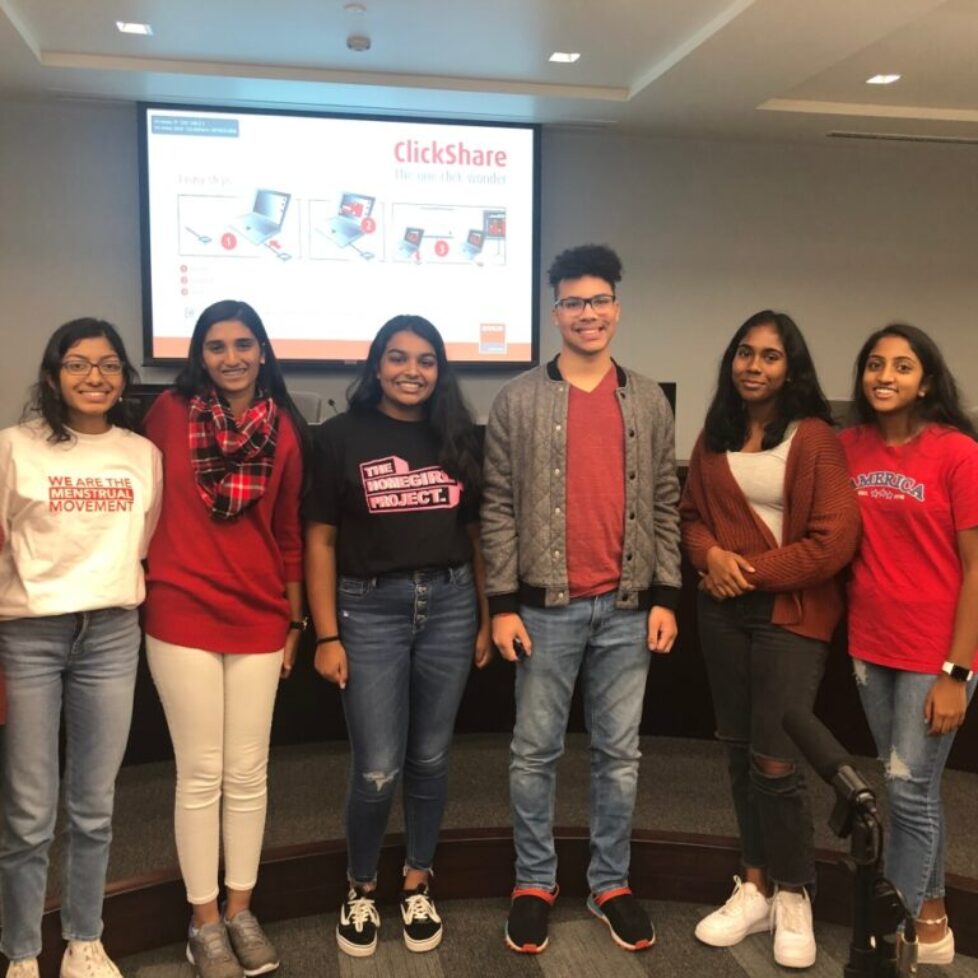
This guest blog post was written by Aanika Eragam, student at Milton High School and a Homegirl Project fellow. On December 3rd, Aanika spoke to the Fulton County School Board about the need for period products in Fulton County Schools. Prior to that, Aanika reached out to Georgia STOMP regarding her research and intention to speak to the School Board. We are honored to be connected to such a capable young leader! Watch the video and hear why!

On December 3, 2019, a coalition of high school students presented a resolution to the Fulton County School Board, requesting a specific policy amendment that would require secondary schools to provide menstrual products free of cost in restrooms. The event was a culmination of collective student outrage stemming from a lack of access to period products in the school setting, an issue that holds grave implications for students’ mental and physical wellbeing, as well as their academic achievement. When products like toilet paper, hand soap, and paper towels are available free of cost in all restrooms, students had to ask why menstrual products, which are also considered a basic necessity, are not.
Students explained to the Board how a lack of free-of-cost menstrual products in public schools confiscates the basic dignity of students, disrupts the learning environment for girls, and for those living below the poverty line, leaves them without basic access. Students hope they made a strong case to the Board and placed period poverty on the agenda. They will continue to work towards ensuring accountability through civic engagement at the grassroots level.